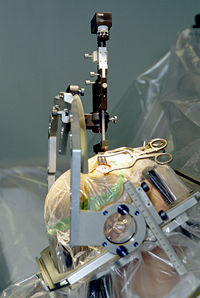Neurosurgery
Neurosurgery is the surgical discipline focused on treating those central, peripheral nervous system and spinal column diseases amenable to surgical intervention. In the United States there are only about 3,000 neurosurgeons.
Modern Neurosurgery
Modern neurosurgery has benefited greatly from advances in computer assisted imaging (computed tomography (CT), magnetic resonance imaging (MRI), positron emission tomography (PET), magnetoencephalography (MEG)) and the development of stereotactic surgery. Some neurosurgical procedures even involve the use of MRI and functional MRI intraoperatively. As one of the most research-oriented specialties of medicine, the scope of neurosurgery has expanded as new diagnostic techniques allow surgeons to perform more complicated surgeries. Some of the most recent and innovative advances have been radiosurgery using the gamma knife for tumor treatment and endovascular surgery for the clipping of aneurysms.
Risks
There are many risks to neurosurgery. Any operation dealing with the brain or spinal cord can cause paralysis (systemic), brain damage, infection, psychosis, or even death.
Conditions
Neurosurgical conditions include primarily brain, spinal cord, vertebral column and peripheral nerve disorders.
Conditions treated by neurosurgeons include:
- Chiari Malformations
- Spinal disc herniation
- Spinal stenosis
- Hydrocephalus
- Head trauma (brain hemorrhages, skull fractures, etc.)
- Spinal cord trauma
- Traumatic injuries of peripheral nerves
- Brain tumors
- Infections and infestations
- Tumours of the spine, spinal cord and peripheral nerves
- Cerebral aneurysms
- Stroke, including hemorrhagic stroke and ischemic stroke
- Intracerebral hemorrhage, such as subarachnoid hemorrhage, intraparenchymal, and intraventricular hemorrhages
- Some forms of pharmacologically resistant epilepsy
- Some forms of movement disorders (advanced Parkinson's disease, chorea) – this involves the use of specially developed minimally invasive stereotactic techniques (functional, stereotactic neurosurgery) such as ablative surgery and deep brain stimulation surgery
- Intractable pain of cancer or trauma patients and cranial/peripheral nerve pain
- Some forms of intractable psychiatric disorders
- Malformations of the nervous system
- Carotid artery stenosis
- Vascular malformations (i.e., arteriovenous malformations, venous angiomas, cavernous angiomas, capillary telangectasias) of the brain and spinal cord
- Peripheral neuropathies such as Carpal Tunnel Syndrome and ulnar neuropathy
- Moyamoya disease
- Congenital malformations of the nervous system, including spina bifida and craniosynostosis
See also
- Anton Eiselsberg – Established Neurosurgery as an independent discipline
- Bio-plate
- Harvey Cushing – Known as the father of neurosurgery
- Walter Dandy – Known as one of the founding fathers of neurosurgery
- Gazi Yasargil – Known as the father of modern microneurosurgery
- Ben Carson – Famous African American Neurosurgeon
- Brian Andrews (doctor) – Noted American Neurosurgeon
- Lars Leksell – Swedish Neurosurgeon who developed the Gamma Knife
- Frances K. Conley Pioneer woman neurosurgeon at Stanford University
References
External links
|
Surgery, Nervous system: neurosurgical procedures (ICD-9-CM V3 01-05) |
|
| Skull, brain, and cerebral meninges |
Craniotomy - Decompressive craniectomy - Lobotomy - Hemispherectomy - Ventriculostomy - Anterior temporal lobectomy |
|
| Spinal cord and spinal canal |
Spinal cord and roots (Cordotomy - Rhizotomy)
Intervertebral discs (Discectomy - Intervertebral disc annuloplasty - Intervertebral disc arthroplasty)
Vertebral bones (Laminotomy - Laminectomy - Laminoplasty - Corpectomy - Facetectomy - Foraminotomy - Vertebral fusion - Vertebral fixation)
Lumbar puncture |
|
| Cranial and peripheral nerves |
Ganglionectomy - Nerve block
|
|
| Sympathetic nerves or ganglia |
Endoscopic thoracic sympathectomy
|
|
| Other |
Axotomy - Hypophysectomy - Vagotomy
|
|
|
Neuroscience |
|
Behavioral neurology · Cognitive neuroscience · Computational neuroscience · Molecular cellular cognition · Neural engineering · Neuroanatomy · Neurobiology · Neurochemistry · Neuroendocrinology · Neuroimaging · Neurolinguistics · Neurology · Neuromonitoring · Neuropharmacology · Neurophysiology · Neuropsychiatry · Neuropsychology · Neurosurgery · Systems neuroscience · Brain-computer interface · Neurotechnology · Neuroelectronics · Neuromodulation · Neuroprosthetics · Neurorehabilitation · Neurorobotics · Neuroinformatics · Neural circuitry (both artificial and biological) · Neural tissue regeneration · Neurobioengineering · Neural signal processing
|
|
